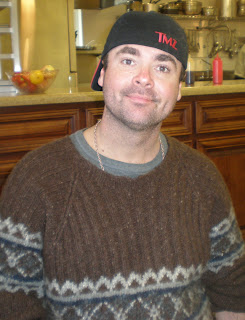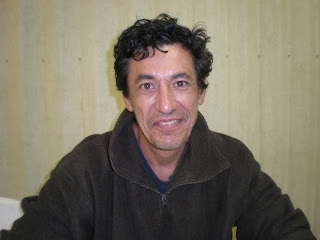 |
| TIM MARVIN - "I'm a free-born, natural man. I'm NOT a person." |
A MAN MADE HOMELESS BY THE HATED TRAFFIC LIGHT CAMERAS
Tim is single, has no children, and has never been married. He is 59 years old.
It is December 29, 2012 when I ask Tim how long he has been homeless.
He answers that yesterday was his first day of being homeless, this time.
Tim has a 1988 Chevy Van that he uses to travel around to different construction jobs where he works. At times, he also lives in that van. But now, there is a big problem with Tim’s van.
Last Summer, while Tim was traveling to Lake County to work on a construction job there, he apparently got hit with a traffic ticket from one of those new (and I argue un-Constitutional) traffic light cameras in Yuba County.
Tim claims that he never received any notice that he had been given the traffic light ticket.
It’s understandable that Tim never got any notice of the traffic ticket, given Tim’s wandering lifestyle.
But now, Tim has received notice from the California Department of Motor Vehicles that his driver’s license has been suspended because of his failure to take care of the Yuba County traffic light ticket.
Tim calls the suspension of his driver’s license without any prior notice a "Travesty of Justice."
Now, for the first time in his life, Tim is forced to accept government assistance, in the form of food stamps, because he no longer has a means of transportation to get to work.
At the time that Tim’s driver’s license was suspended because of an unpaid traffic light ticket, he had a completely clean DMV record.
Because Tim can’t get to work, he has ended up jobless, and homeless.
When I ask Tim what he is going to do next, he answers, "I don’t know."
"It’s difficult, because the ticket was all the way down in Yuba County.
"I avoided being homeless for a while by staying with my relatives. I’d spend a few days sleeping on the couch at one relative’s house, and then, I’d spend a few days at another relative’s house. But eventually, I wore out my welcome with all of my relatives. So, now, I’m homeless.
"I talked to a lawyer about getting the traffic light ticket cleared up. But the lawyer wanted $400 to do that. I don’t have that kind of money.
"I thought about trying to do the legal work myself, and to represent myself in court. But... the courts don’t have any respect for people who try to represent themselves.
"I would like to find an attorney who could get this case dismissed, and get my license back, so that I can work again."
I look at Tim, and I have to shake my head.
I will try to find a lawyer who can help him with his unpaid traffic light ticket in Yuba County, but I don’t know many lawyers in Yuba County.
In the mean time, here is one more example of a man who has been rendered homeless by corrupt California laws and incompetent or corrupt California legislators and judges.
All it would take to put an end, once and for all, to these hated traffic light camera tickets, and the way that they are being used to gouge additional money from citizens for local governments and their private enterprise camera partners, would be for one judge to call these traffic light cameras what they really are...which is an unconstitutional.
Charging an American Citizen with a crime without giving that citizen the right to confront and examine his accuser in court is a violation of one of our most basis and most important Constitutional rights.
And yet, for whatever mysterious reason, we lack the judges with the Constitutional competence...or, the courage... to simply call these damned traffic light cameras what they really are.
So now, Big Brother really is watching.
And now that we have allowed our government to institute this form of Big Brother watching, it will grow into all other areas of our lives like an aggressive cancer.
As for Tim’s loss of his license, and his resulting joblessness and homelessness, Tim says, "I’m not so angry about it, as much as I’m just in shock.
"I’ve parked my van at my sister’s house, so that I don’t lose it to being impounded. And I’m out on the street.
"It’s difficult for me to get around, and to get anything done, because I can’t get a free bus pass. And the buses around here don’t run very well anyway. I have to walk about ten miles a day just to do the things that I need to get done every day."
If Tim had a magic wand, so that he could be or do absolutely anything, what would he be, or be doing?
"I have this dream that I’ve had for many years," Tim says. "I’d find a piece of land in Nepal that had a hot springs on it, and that also had a view of the Himalayas. There, I’d build an orphanage, and a retreat center where people could come to find inner peace and healing.
"I’m good at designing and building homes. So, I have all of the skills it would take to build an orphanage and a retreat center.
"My lifestyle of being single has permitted me to do a lot of traveling, and to learn a lot of different construction skills.
"I don’t consider myself unemployed. I work for a living. I just can’t get to any work right now."
I ask Tim if he has a message for the world.
He answers, "I guess I’d say something of inspiration that sets everybody right. I don’t know what that is. I guess I’d say, follow the message of Jesus."
"I have a great hunger for knowledge. I’ve been called a walking encyclopedia, at times.
"I have walked with paupers, and kings, and with Hollywood movie stars.
"I’ve also spent weeks sleeping alone in the woods.
"I would tell everyone to love knowledge, and to seek knowledge. For without knowledge, you and your people will perish.
"I meet a lot of younger men, these days, who say, ‘I know what I know. And that’s all I need to know.’
"That’s not a very healthy attitude toward learning. That kind of an attitude toward learning will cost those young men dearly."
I ask Tim what he believes makes him special and unique in the world.
"I am the first-born child, of the first-born child, of the first-born child for six generations," Tim says. "I am a free-born man of the soil.
"I am NOT a person. You know why? Because a person, by law, is a corporation. And a corporation can be taxed. But a natural-born man cannot be taxed.
"When Wesley Snipes went before the federal court for failure to pay his taxes, the federal judge asked him just one question. The judge asked him, ‘Are you a person?’
"If Wesley Snipes would have answered no, then he would have gotten off. But as soon as Snipes answered that he was a person, then the court nailed him for all of those back taxes."
Interesting legal theory that Tim has.
It’s not a legal theory that I was taught in law school.
But then again, I guess it makes about as much sense as allowing a camera to charge an American Citizen with a crime without giving that citizen any right to confront and examine his accuser in court.
It certainly makes as much sense as suspending a citizen’s driver’s license without first making any proof that the citizen was ever given any notice of the traffic light camera ticket in the first place.
But hey, when it comes down to generating a little extra income for municipalities to keep government bureaucrats fully employed, an American Citizen’s Constitutional rights are just a minor formality, right?
Happy New Year... in the New America. Good luck. Happy Hiking.
This is the one-hundred-and-thirteenth in a series of articles written about Auburn-area homeless people by local attorney, author, and Sierra College Instructor Bob Litchfield.











